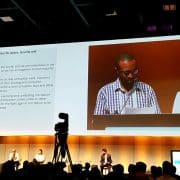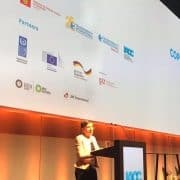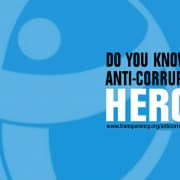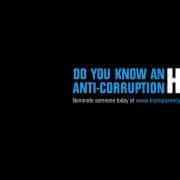|
Getting your Trinity Audio player ready...
|
Transparency International’s (TI) MD Cobus de Swardt recently chatted to Biznews.com about his career with the global anti-corruption organisation. Listen to the podcast, or read the transcription below.
Well, when I first met Cobus de Swardt here at the World Economic Forum in Davos, I thought this man has a good South African name, but you didn’t sound very South African, but you very much are, from Cape Town.
Yes, absolutely and I’ll be going there in a few weeks’ time, also speaking in Joburg at an anti-corruption conference in February.
You’re waving the South African Flag very well as the Head of Transparency International, the organisation which globally taps into the whole chain of corruption and tells us what’s happening.
Well, when I was appointed to the position, I told the board at that point that there are two things I believe about corruption. One, that it’s a global problem, it’s not a problem of the South and slightly ironically, soon after that the financial crisis broke and one could see the absolute devastating impact that corruption in the North has in fuelling corruption also in our own country. At the same time, it is for Africans and in our case, South Africa to do its part.
Here one could only be saddened to see how corruption is very pervasive in our country, it is very detrimental to our social progress, whereas one has to accept the fact that our continent including our own country continues to have a massive wealth stripping by illicit outflows that one has to tackle as well, but the confidence of the world in South Africa dealing in an open and transparent way with its public finances, with its resources, has been seriously undermined and that confidence has to be rebuilt.
It can only be built with very high levels of transparency, the political leaders have to lead by example and that’s why a call that I’ve often made, not only to South Africans, but across the world for public contracting to be cleaned up, for the beneficial onus of companies that bid for public contracts, for that to be in the public domain, for politicians and senior bureaucrats to have asset and interest declarations in the public domain. Our constitution provides for a lot of very positive advancements, but it’s the integrity of those in leadership positions that need to be demonstrated. It’s not a unique problem to South Africa, but we care deeply and I care deeply about our country and that’s why I will continue to push for it.
How did you get into this field, just tell us a little bit about your background?
Ironically, I’m a human rights activist (ironically, because people often don’t see the connections between corruption and human rights). As an anti-Apartheid activist in Cape Town and that quest for social justice, that remained what I was striving for and whilst I would be the last person to say that I would rather fight corruption than Apartheid. To a large extent, I became very convinced in the years following Apartheid that the experience that I have of a very corrupt regime and how that benefited a few, the majority was indeed one of the key social problems of our time and that’s why the transition to fight corruption was to me quite natural.
How did you get to Transparency International?
Like all things in life there are also coincidences. Coincidences in so far as I was at a very young age convinced that I would always just be an academic. Then I became an activist, but I was still an academic, I taught at the University of the Western Cape, I was very committed after the end of Apartheid, that I would not go into politics because I didn’t fight Apartheid because of the politicians, I fought Apartheid because I was an ordinary citizen that said, “One has to stand up for social justice”, but then turn the clock ten, fifteen years forward, I missed the activist and that’s why I looked around and I fought not only the struggle against corruption but also Transparency International, and it has a very interesting mix.
It’s a dream job for someone like you, it has to be.
I wouldn’t say so.
You’re chasing the bad guys every day, or at least exposing them.
They’re also chasing me and it’s a job where some of our people get killed, it’s a nightmare job in many ways.
So many people get killed?
Yes.
How, why?
In Rwanda we had one of our people killed just over a year ago investigating police corruption. He left the office and was found hanging in a tree.
What do you do about that, what can you do?
Well, it took a year before there were any arrests and in the end there were two police officers arrested and convicted.
That’s the good news, but I guess there are also some not such good new stories. I mean it’s not good news that you lose someone, but at least the family could close the lid.
Well, not totally because of course, you have the personal issue, but the amount of threats to our activists around the world in the last five or six years have increased with a factor of ten.
Why is that?
I think for three reasons. One, when you look across the world, including very advanced democracies, you have over the last years a decline in civil liberties and people continue to say on this day, when in a few hours the US will have a new president, this is terrible for what is happening in the US, the US is not unique here. If you think of our own country, the amount of xenophobia, the amount of inward-looking, the amount of trying to curtail the freedom of the press, the tax on journalists. That is the general and secondly, because vested interests have realised that the fight against corruption are no longer being fought at just a policy level, there’s a bottom up swell. If you think, Alec, of the 20 biggest uprisings in the last 12 months, virtually all of them were driven by corruption, South Africa, Brazil, Romania, Guatemala, Malaysia, so vested interests realise this is no longer a few nerds playing at the policy level.
The nerds can give the information to the masses.
Well, of course it’s actually those that are activists and there’s a broad consensus, so this bottom up swell, I think has really made vested interests. Thirdly, we have for many years worked very much on systemic reforms. We continue to do that, but we are also going after the corrupt. We have campaigns on no impunity, we are not in the business of just naming, and shaming, but we are not shy to confront and to confront in a way that clearly tries to bring about a change that is sustainable.
With all these attacks on your colleagues, are you finding that Transparency International’s relevance is growing; is this part of the reason for it, or is it just a ground swell where everybody who’s fighting corruption is being targeted?
I think it is much wider than TI. I’m of course, much more aware of our own people and the fact that we are present in over 100 countries, does expose us obviously more. You have many other organisations that also fight corruption and that’s great. Very often they are not locally routed, which is also fine, but it does mean that they don’t have people at grass roots that have to face the brunt of intimidation of threats in the same way as our people do.
You meant it earlier that you’re a citizen who wanted to change things, who wanted to get involved. We’re seeing this happening increasingly in South Africa. I’m not sure if you would believe that some kind of a tipping point has been reached there yet.
Well, I think that if you’re taking a huge step back to 1989, the Berlin Wall comes down, 60 days later the ANC is unbanned, Madiba is released, The Cold War is over, and the world was our oyster. A few years later, in 1994, we had one of the most incredible constitutions; we had a world in awe of what we’ve achieved ready to support us. It sends chills down your spine. We achieved something to the magnitude of what the Colombians will achieve at the moment, we actually brought a peaceful resolution to a conflict that could have lasted until today and me and you would arguably not be standing here, we might not be alive, so that’s incredible. At the same time in terms of the distance that we’ve travelled, I think we could have done so much more, in terms of bringing social justice.
How did we lose it?
I think that we did a number of things right, we prevented and there, that’s one of the legacies, I believe, of Madiba, prevented any further escalation of conflict in the country and I think bringing a stability in was really important, I think that bringing in economic stability in with our macroeconomic policies probably was the right move, but I think that we somehow lost sight, that as our economy was integrated into the global economy, we would see that those that are well-educated, that have beyond a normal matric education, some college or university education, that they would be huge beneficiaries of that, but that’s not where the majority of our people sit.
That’s why what we see in countries across the world, our country particularly saw very strongly that those that were in jobs, that were essentially part of a high tech, global economy did really well and those that were in very low manual jobs, subsistence became even more insecure and that’s why you know when you look at it a third of people did really well, a third did kind of okay over the last 25 years and a third are really in many ways worse off than what they were at the end of Apartheid, also because our economy is much more monetised than what it was then and I think that is something that could make no South African sleep well.
Well, there’s a change in thinking, there’s a more collaborative effort between business, labour, and government, all coming out of the crisis that the country went through in December 2015. Do you have hope; do you believe that this young democracy is going to come through the fire and come through it stronger?
Of course you have to have hope. I think that if one thing has really characterised South Africans and South Africa over its recent history is that we are quite tenacious and I think that the hope is also for me that there are so many structural issues still in our advantage, our infrastructure is quite good, and our levels of education are fairly good.
We know all of that, but why I’m asking you specifically, is that it’s almost a binary situation in South Africa. You have the tenderpreneur/corrupted plunders of the public purse on the one hand and you have those who are trying to defend against them on the other. Which party in your experience (because this is a field you know very well), is there a historical precedence for the corruptors winning a battle like this?
There are many historical precedents of the corruptors winning those battles. If you just look at Eastern Europe, the Ukraine is a very good example where the plundering has been highly successful, so yes you have, but why am I more optimistic about South Africa? There are a few things that are very simple, very easy, that can be massive game changers within 2017. I told Jeff Radebe yesterday, because I had a very good meeting and I said there, “If the South African government were to clean up public procurement, it will be a major game changer. It’s not as difficult to do. If they were required -“
There’s a lot of work there, I mean a lot of work has been done there already.
Nobody should be able to bid for a public contract if their beneficial owners are not in a public domain including their interests and assets. That is something that can be enacted within three months. It will not only take away the suspicion that very many public contracts are corrupt, it can also deal with a reality in terms of making sure that, that is done, but that has to be combined with very widespread use of public asset and interest declarations, with anybody that works with the public purse. That means not only ministers, parliamentarians, but also those in the public sector and at a local level.
That is not so easy to bring in but if there’s the political will, that can be done and the game changer is that what you can have is South Africa seen as a country that has relative to its potential actually been losing out on the fight against corruption, it can be quite a game changer in saying here is a real attitude change. There is a huge concern in the outside world, as you know, similar to in South Africa, what happens after Thuli goes (the Public Prosecutor), because she’s been seen as such a beacon of integrity, standing up in her very non-confrontational way just calling it the way it is. That’s why what happens there has to be mixed also with some action in terms of showing that those that hold public office don’t have anything to hide.
Well, the new public protector has not exactly had a great start with her first two little shenanigans, but we still do have Thuli Madonsela and I’m sure she’s going to play a role in some way, in the same way as you’re going to play a role in South Africa in the future. Are you intending to come and wave some anti-corruption flags there when your term ends with Transparency International?
Alec, whenever there’s any discussion in TI on South Africa I recuse myself. We had a chapter in South Africa a few years ago when that chapter was disaccredited because there was a feeling they were not doing enough, I recuse myself. I don’t try and influence it; I have a conflict of interests.
Disaccredited?
It means they were no longer a part of TI and we have a new group that we’re working with, that you know is Corruption Watch, but also in that decision to work with them, I had no part in that.
You can’t even tell me if David Lewis is doing a good job or not.
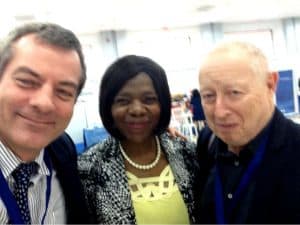
Cobus de Swart, former public protector Thuli Madonsela, and Corruption Watch executive director David Lewis at the 17th International Anti-Corruption Conference in Panama in December 2016 (photo by Cobus de Swardt).
I think he’s doing a very good job, but internally, I stay totally out of that and there are two very simple reasons. One is, I take issues of conflict of interest very seriously, and I think that when you see what’s happening in the US today in an absolute dealing with conflict of interest that one fought in the 1980’s we’ve moved beyond that. I think leading by example is important there, but the second reason is, I don’t think about South Africa with my head, I think with my heart and when you think with your heart you should not be involved in making policy decisions.
So yes, I think South Africans and as a South African I’m proud of what Corruption Watch has done in a short space of time, but in terms of TI, me coming back and working on corruption, I wouldn’t be able to say absolutely no, but I would think that my quest in terms of what I do in South Africa is the broader one on social justice and corruption I see as key to that, but I wouldn’t say that it would be a narrow focus on corruption.
Cobus, I’m sure there are people listening to this and saying, “How can I help, what can I do? This man’s putting chills down my spine, he’s getting me motivated, I know that the stakes are high, I can see it every day, and how can I play my part?”
Well, we have a declaration against corruption, 47 words, five things that people can do. It’s a bit self-serving but if you go to our website you can see it: Not to pay bribes (quite simple), not to ask for bribes, report on when you see suspicious issues, work with those that do fight corruption and that doesn’t need to be TI, of course, it can be at a local level, and fifthly, and very importantly, only support candidates for elected office that demonstrate in their actions a commitment to transparency and accountability.
We have many chapters around the world that have done very interesting work by putting it on their websites, all candidates from political parties running for office, what those candidates have done to demonstrate their accountability, starting with basic issues such as tax returns (again an issue in the US at the moment), issues on terms of interest declarations that go wider than just a person, but also its immediate family and connections. So ordinary people have actually been a game changer in corruption in the last couple of years because corruption you can only deal with it to a very limited extent in a forensic way because it is often too complicated and technically, those that are corrupt are very advanced.
The most cost-effective anti-corruption measures are most definitely those that put information into the public domain to the greatest possible extent and there, I think the push, for example, for open data, for all government contracts going back to public procurement, to be published publicly including the reasoning why a bid was awarded to a particular tender and not to others, we are way beyond the days to say that this is commercially sensitive information. It has a two-fold impact on that. Not only does greater transparency in public policy-making make better policies, but they also build a trust in it, they build trust of business because the days where you had this divide to say all businesses are corrupt are over. Business has actually (including South Africa), done a lot to advance the struggle against corruption.
A final point, you mentioned one of your colleagues was murdered in Rwanda for investigating the police. Not all police forces around the world are above the law, yet for most citizens, that’s where they would go to report corruption. What do you do if the police force isn’t trustworthy?
We do something called a ‘barometer’ where we look at the various institutions and how the public views them. In the case of South Africa, unfortunately, the police and the trust in the police is much lower than in many other institutions and relative to other countries we perform some of the worst.
It’s not surprising, we had Jackie Selebi who went to jail as the head of police, but what do you do as a citizen in that environment.
That indeed is a huge problem. At the same time there’s also some positive in that our legal system relatively speaking is held in higher regard, also by our own people. Therefore, one shouldn’t just look at it as a negative and that’s why the potential recourse, when you are wrong in South Africa, would be higher than in many other countries because of our legal system. In terms of police, clearly when you stay isolated as an individual, you are particularly susceptible.
That’s why in dealing with the police, it would be very important for people to, also when they approach the police, to not do it alone, do it with others, there are whistleblowing lines including Corruption Watch in South Africa that when you find things where you feel you have been wronged by the police, those need to be used. I’m not saying that’s an easy way out because ultimately you still need to build the trust in the police and that is something that if we see each other here next year, would not have been achieved by then already, that will take some time, but clearly there is a need for signs in terms of the overall management of the police in terms of how their integrity works? Yes.
Cobus de Swardt is the Head of Transparency International and this special podcast was brought to you by BrightRock.

